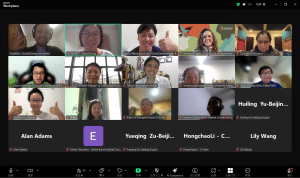On the 9th of December, China Development Brief held the annual forum, inviting both international non-governmental organisations (INGOs) and local NGOs to gather and discuss challenges, responses and coping strategies for the non-profit sector during and after the COVID-19 pandemic. Apart from the inauguration address made by Ray Zhang, Board Chairman of Beijing E-Share Civil Society Information Center (China Development Brief), the morning session included the opening speech delivered by Elizabeth Knup, regional director of the Ford Foundation and two roundtable discussions. Each roundtable discussion was mediated by an academic whose research field concentrates on the domestic and international philanthropy sectors. Guests of the roundtable sessions are chief representatives from INGOs and CEOs from domestic NGOs.
Ray Zhang, as the Board Chairman, opened the forum by warmly welcoming all the attendees. The uniqueness of CDB’s Annual Forum, he stressed, lies within the focus of collaboration between NGOs, regardless of their origins and sectors. CDB has always tried to create an inclusive environment which allows NGOs to equally exchange thoughts and information. Moreover, Ray mentioned that the CDB forum is not a non-governmental event and not in the purpose of profits. Rather, the forum involves organisations and individuals who care about the development of NGOs all over the world, they come, build networks, have communications, share each other’s concerns and burdens and inspire the whole sector to be more diverse, innovative and forward-looking.
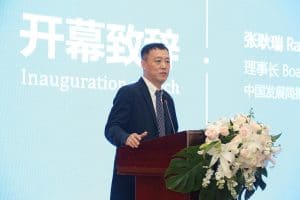
Elizabeth Knup, regional director of the Ford Foundation, started her speech by first talking about crises the pandemic has brought to NGOs worldwide. Chinese NGOs are of no exception, said Knup. However, she shared some rather optimistic anticipations and claimed that philanthropy is a business of hope. Taking evidence from foundations in China, Knup regarded the pandemic as in fact encouraging foundations to more effectively mobilise resources and apply flexible programme arrangements. As such, she said this is empowering NGOs to continue their work and promote institutional resilience, and what NGOs have been doing is “a business of hope”.
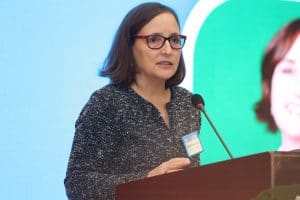
The first roundtable discussion emphasised challenges faced by INGOs operating in China during the pandemic and accordingly, their coping strategies. Li Yan, the chief representative of Greenpeace in China, and Michael Hermann of Humana People to People spoke of finding the best ways to apply financial resources and what to prioritise. Li Yan especially said the COVID-19 pandemic has at least helped people rethink humanity’s relationship with the environment. Though Shi Yu, general director of Handicap International, stressed the importance of more aid and advocacy for the disabled as the pandemic has exacerbated social exclusion for vulnerable groups.
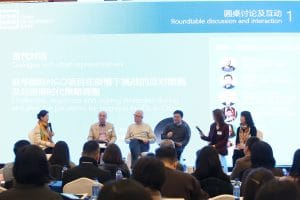
Domestic perspectives on expectations for INGOs to help the local NGOs address setbacks linked to the pandemic dominated the second roundtable. Director of Beijing Social Work Development Centre for Facilitators Li Tao said INGOs have made a positive difference helping domestic NGOs clearly articulate and recognise core civil society values. Director of Leadership Matrix Network Li Ping said while INGOs have consistently helped domestic NGOs through providing training and capacity building, domestic NGOs have usually been less active; Jiang Qian, the director of Anhui Yihe Commonweal Service Centre, underscored evolving synergy between INGOs domestic NGOs, especially within the last seven to eight years of her work.
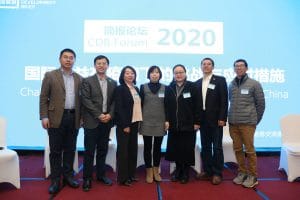
While speakers generally agreed social divisions from COVID-19 is a problem to tackle in the coming years, Peng Haihui of Nanchang Ahimsa Philanthropy said he sees NGOs occupying a vital role in a time of political uncertainty. However, Jiang Qian stressed the need for capital to fill more development gaps in central China, as opposed to eastern and western regions receiving more attention and resources.
Rounding out the session, panelists shared common expectations for INGOs: localisation for addressing domestic social issues, an emphasis on grassroots partnerships, equitably reaching out to vulnerable groups, continuous financial support and training for domestic NGOs and a thorough understanding of China’s state guidelines regulating civil society.



